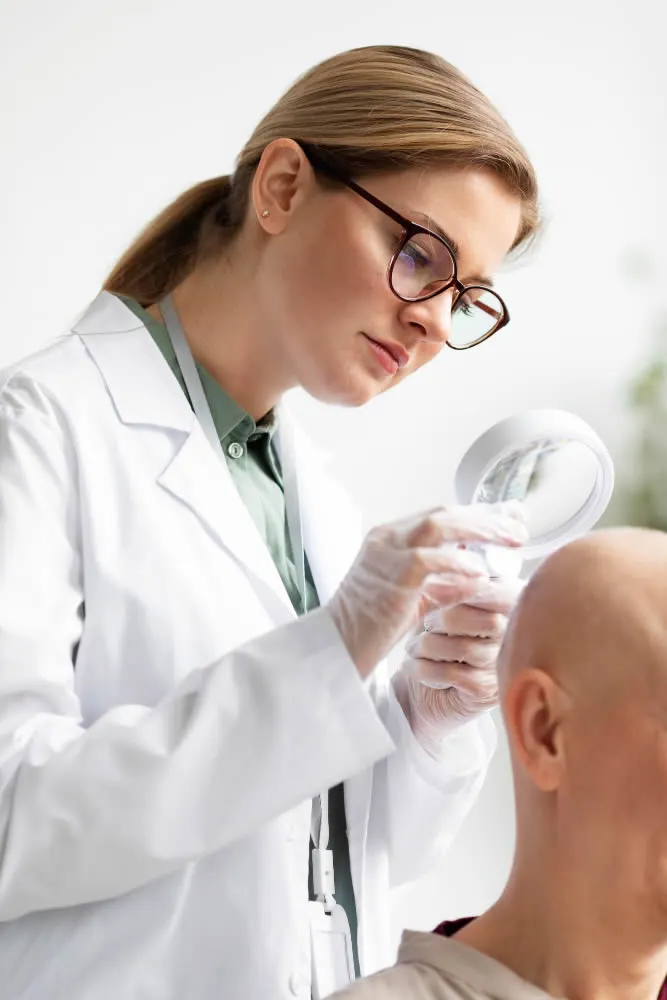What is Merkel Cell Carcinoma?
Merkel cell carcinoma is an uncommon skin cancer originating from Merkel cells in the skin’s top layer, often found in sun-exposed areas like the head, neck, arms, legs, and trunk. Also known as neuroendocrine carcinoma or trabecular cancer, it arises when Merkel cells grow uncontrollably.
Rapid growth and early spread to nearby lymph nodes, distant lymph nodes, skin, lungs, brain, bones, or organs are typical. These cells, positioned close to touch-sensing nerve endings, contribute to touch sensation.
Remarkably rare, Merkel cell carcinoma ranks as the second leading cause of skin cancer deaths, after melanoma.

What are the symptoms and causes of Merkel Cell Carcinoma?
Merkel Cell Carcinoma (MCC) often look like shiny or pearly lumps on sun-exposed areas like the face, neck, arms, and eyelids. These lumps can be skin-colored, red, purple, or bluish-red, and they may grow quickly. Darker-skinned individuals might find them on their legs, while younger people often notice them on the torso. These growths can even break open, forming wounds or sores that can be tender or itchy to the touch.
The primary contributor to MCC is exposure to ultraviolet (UV) rays from the sun or artificial sources like tanning beds. These UV rays can damage the DNA within skin cells, potentially leading to various skin cancers, including MCC. About 8 in 10 MCC patients also carry the Merkel cell polyomavirus (MCP), which usually remains dormant.
How to Diagnose Merkel Cell Carcinoma?
- Physical Exam and Health History: The initial phase starts with a comprehensive physical examination with our dermatologist to gauge general health and identify any unusual signs, such as lumps or other irregularities. Reviewing the patient’s health history, including habits, past illnesses, and prior treatments, is crucial for establishing a complete picture.
- Full-Body Skin Exam: The dermatologist will examine the skin’s entire surface, looking for unusual spots or bumps in color, size, shape, or texture. Additionally, the condition of lymph nodes, including their size, shape, and texture, is evaluated.
- Skin Biopsy: If irregularities are detected, a skin biopsy is performed. This involves removing skin cells or tissues for microscopic analysis by a pathologist. The objective is to identify any signs of cancer within the sample.
Once MCC is confirmed, efforts shift toward understanding the extent of its spread, a process termed staging. Staging aids in determining the disease’s progression and tailoring suitable treatment approaches. Several tests and procedures contribute to this staging process:
- CT Scan (CAT Scan): This imaging technique generates detailed images of the body’s internal areas from multiple angles. Dyes might be introduced to enhance organ visibility. CT scans can identify primary small cell lung cancer or locate MCC that has spread. They’re particularly useful for assessing the chest, abdomen, head, and neck regions.
- PET Scan (Positron Emission Tomography Scan): A PET scan identifies malignant tumor cells in the body by injecting a small amount of radioactive glucose into a vein. The scan captures areas where glucose is utilized more actively, highlighting cancerous cells that exhibit heightened glucose consumption.
- Lymph Node Biopsy: Various techniques are utilized to stage MCC through lymph node examination.
-
- Sentinel Lymph Node Biopsy: The sentinel lymph node (the first node in a group) is removed during surgery. A radioactive substance or blue dye is injected near the tumor, guiding its flow to the lymph nodes.
- Lymph Node Dissection: Surgical removal of lymph nodes allows for microscopic examination to identify signs of cancer. Regional or radical dissections are carried out based on the extent of lymph node involvement.
- Core Needle Biopsy: A wide needle extracts a tissue sample for microscopic examination by a pathologist.
- Fine-Needle Aspiration Biopsy: A thin needle retrieves a tissue sample for microscopic evaluation.
- Immunohistochemistry: This laboratory test utilizes antibodies to detect specific antigens in tissue samples, aiding in diagnosing and differentiating various types of cancer.

What are some of the treatments for Merkel Cell Carcinoma?
When it comes to treating Merkel Cell Carcinoma (MCC), there are several options depending on the patient’s needs.
Treatment Options:
Surgery: Surgical intervention. Two main procedures are employed:
-
- Wide local excision: This involves removing the cancerous growth along with surrounding tissue. Sometimes, a sentinel lymph node biopsy is performed simultaneously. If lymph nodes are affected, a lymph node dissection might follow.
- Lymph node dissection: Removing lymph nodes to analyze them for cancer. Regional or radical dissections are conducted depending on the extent of lymph node involvement.
Radiation Therapy: High-energy radiation, like x-rays, is directed at the cancerous area to halt cell growth. External radiation therapy, which targets the body from outside, is a common approach. It may serve as palliative therapy to alleviate symptoms and enhance the patient’s quality of life.
Chemotherapy: Using drugs to halt cancer cell growth, chemotherapy can be administered orally, intravenously, or through injections. Systemic chemotherapy aims to reach cancer cells throughout the body, destroying them or stopping their division.
FAQ About Merkel Cell Carcinoma
Are there stages of MCC, and how do they affect treatment?
Yes, MCC has stages that determine the extent of cancer spread. Staging guides treatment decisions, with localized MCC having better outcomes than metastatic cases.
What are the potential long-term effects of MCC treatment?
While treating MCC is crucial, it’s natural to wonder about potential long-term effects. Surgery, radiation, and chemotherapy may lead to side effects, including scarring, skin changes, and fatigue. These effects can vary depending on the treatment type and individual factors.
What factors influence MCC survival rates?
MCC survival rates are influenced by factors like overall health, age, and cancer stage. Localized MCC has a better prognosis compared to metastatic cases.
Is there a dermatologist near me in Durham that offers treatment for Merkel Cell Carcinoma?
Yes. At our Durham dermatology office, we offer treatment for Merkel Cell Carcinoma to patients from Durham and the surrounding area. Contact our office today to schedule an appointment.

